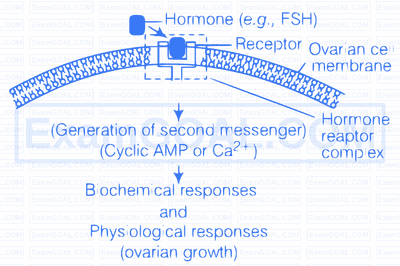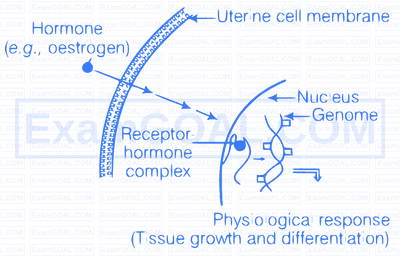Differences between the mechanism of action of a peptide and a steroid hormone are as follows
| Peptide Hormone Action | Steroid Hormone Action |
|---|---|
| Peptide hormones interact with membrane bound receptors. |
They interact with intracellular receptors to form hormone receptor complex |
| They generate second messengers (e.g. cyclic AMP, $\mathrm{IP}_3, \mathrm{Ca}^{2+}$, etc.) |
They regulate gene expression or chromosomes function by the interaction of hormone receptor complex with the genome. |
| The second messengers regulate cellular metabolism. e.g. oxytocin insulin, glucagon, vasopressin. etc, |
Cumulative biochemical actions results in physiological and development effects. e.g., cortisol, testosterone, estrogen and progesterone. |
 |
 |
Hypothalamus is a very small but extremely important part of the diencephalon that is involved in the mediation of endocrine, autonomic and behavioural function.
It contains several groups of neurosecretory cells called nuclei which produce hormones. Hypothalamus provides anatomical connection between the nervous and endocrine system. It controls the release of major hormones by the hypophysis which are summarised below
(i) Adrenocorticotrophic Releasing Hormone (ARH) It stimulates the anterior lobe of pituitary gland to secrete Adrenocorticotropic Hormone (ACTH). ACTH stimulates the synthesis and secretion of steroid hormones called glucocorticoids by adrenal glands.
(ii) Thyrotropin Releasing Hormone (TRH) It stimulates the anterior lobe of pituitary gland to release Thyroid Stimulating Hormone (TSH).
(iii) Growth Hormone Releasing Hormone It stimulates the anterior lobe of the pituitary gland to release growth hormone or somatostatin.
(iv) Gonadotropin Releasing Hormone It stimulates the anterior lobe of the pituitary gland to release gonadotropic hormones (FSH and LH).
(v) Prolactin Releasing Hormone (PRH) It stimulates the anterior lobe of the pituitary gland to secrete prolactin.
(vi) MSH Releasing Hormone It stimulates the intermediate lobe of the pituitary gland to secrete Melanocyte Stimulating Hormone (MSH)
These hormones released from hypothalamus are involved in the process like temperature regulation, control of water balance in body, sexual behaviour and reproduction, control of daily cycles in physiological state, behaviour and mediation of emotional responses. Hence, hypothalamus is called as super master endocrine gland of body.